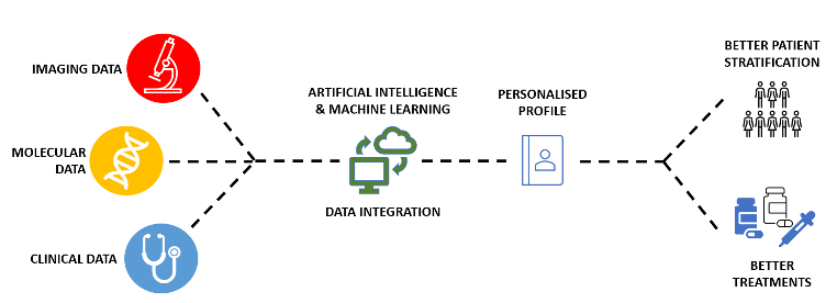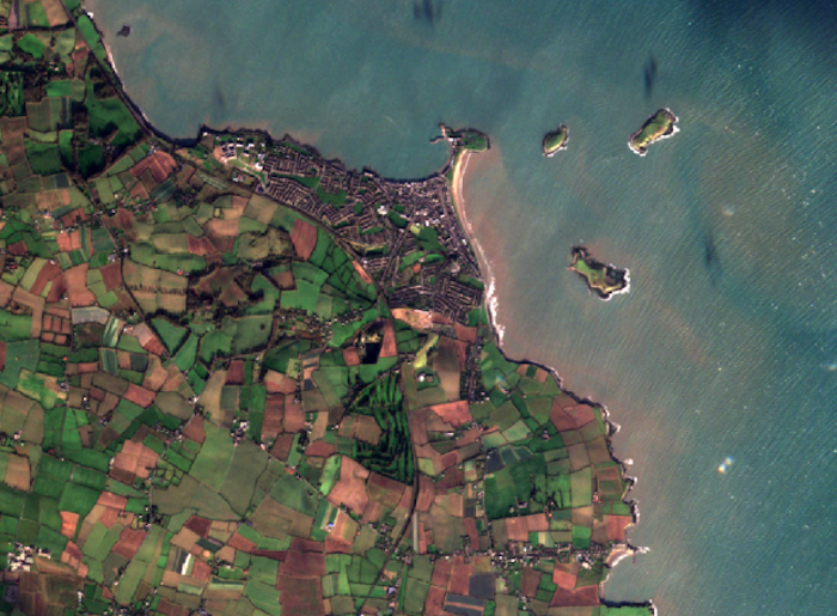CS researchers partner in three successful Disruptive Technologies Innovation Fund projects
News
- EoI for Postdoctoral Fellowships 2024
- CS start-up a finalist in VentureLaunch Accelerator Programme
- University College Dublin Joins ROBUST-6G Project
- Cyberwise Cyber Security Shared Learning Day
- 2nd Summit on Security and Privacy in Future Mobile Networks (SECURENET) 2024
- Message from the Head of School
- Ulysses Medal Awarded to Professor Geoffrey Hinton: The Godfather of AI
- UCD CS academics invited to organise prestigious Dagstuhl seminars
- UCD College of Science Women in Science Mentoring Awards
- PhD Poster Event 2024
- “Back to the Future” Software Engineering Evening
- Improving resilience to the threat of coastal flooding
- Alumnus In Conversation - Fergal Reid, VP of AI at Intercom (PhD 2013)
- Computer Science Summer School
- Welcome to CS News 2023
- EoI for Postdoctoral Fellowships
- EU MSCA SE RE-ROUTE Project Kicks Off to Design Futuristic Multi-Modal Transportation Platform
- PhD Poster Event
- UCD wins at AI Ireland AI Awards
- UCDCS Athena SWAN Award
- Jan Łukasiewicz
- International Men’s Day
- 1st Year BSc Halloween Networking Event
- Ada Lovelace Energy Hackathon
- 5G for digital healthcare in COVID-19
- UCD CS Faculty Elected Vice Chair of ACM SIGCSE
- CS Big Data project for strategies to combat childhood obesity recognised for its innovation potential
- Welcome to CS News 2022
- UCD CS to host the 27th ACM Innovation and Technology in Computer Science Education
- UCD Computer Science Success in SFI Frontiers to the Future
- Why study Computer Science at UCD?
- CAMEO project receives funding from the Disruptive Technology Innovation Fund
- Congratulations to the Class of 2021 - MSc Forensic Computing & Cybercrime Investigation
- Computer Science Colleagues’ success in Interdisciplinary Research Scheme
- ML Labs Annual Newsletter
- Seagate CORTX Challenge
- UCD Academic awarded the 2021 Beijing Great Wall Friendship Award
- Recent funding successes and industry collaborations
- EU H2020 SPATIAL project
- recsyslabs - privacy preserving personalisation for publishers
- Congratulations to our recent PhD graduates
- UCD In Conversation: Cybercrime causes, trends, and prevention
- CS researchers partner in three successful Disruptive Technologies Innovation Fund projects
- Welcome to CS News, the new UCD CS magazine
- Congratulations to our recent PhD and research MSc graduates
- New book showcases digital forensic research by UCD law enforcement graduates
- Training the next generation of Computer Scientists
- Industry Partnership Event to showcase new research on using machine learning
- Poems that Solve Puzzles: The History and Science of Algorithms
- A welcome to incoming first year Computer Science students
- Zoom for Thought with Prof. Muthoni Masinde
- iPROCEEDS-2: Starting of the long-distance master programme on forensic computing and cybercrime investigation
- Short Term Contract Positions Opportunities
- Most Influential Paper Award at the 28th International Requirements Engineering Conference
- From the School of Medicine in partnership with the School of Computer Science
- 2nd Workshop on Implementing Machine Ethics on 30th June
- CeADAR receives Enterprise Ireland Funding for a new Supercomputer
- Assistant Professor Brett Becker awarded Research Fellowship
- UCD CS Masters Student wins prestigious Intel Student Scholarship
- Navigating COVID19 data with a little help from a tame data scientist
- PhD Positions
- UCD Computer Science Project Nominated for Two Education Awards
- Vacancies - Lecturer/Assistant Professor in Computer Science (x2)
- Ad Astra Fellows - Applications to Computer Science
- CALL OPEN - PhD Scholarships 2020 in Machine Learning
- Commissioner of An Garda Síochána visits the School of Computer Science for Conferring
- Computing Education Group SIGCSEire to launch in UCD on December 11th
- UCD Computer Science wins over €34m in Research Grants in 2018-19
- UCDCS Best Short Paper award 13th ACM Conference on Recommender Systems (RecSys)
- CS Sparks Programme
- CS Sparks
CS researchers partner in three successful Disruptive Technologies Innovation Fund projects
UCD CS researchers are partners in three research projects which have secured funding under the third round of the highly competitive Disruptive Technologies Innovation Fund (DTIF), from the Department of Enterprise, Trade and Employment and administered by Enterprise Ireland.
This year 62 applications were received and 29 projects secured €95m across Ireland in life sciences, medical devices, ICT, artificial intelligence, manufacturing and environmental sustainability. All projects involve collaborations between SMEs or multi-national corporations and researchers in higher education. The eligible projects went through a rigorous and competitive evaluation process involving screening and interview by panels of international experts, who assessed the quality of the disruptive technology, the excellence of the overall approach, the economic impact and sustainability and the strength of the collaboration. The €500m DTIF was set up in 2018 as part of the National Development Plan 2018-2027 to drive collaboration between Ireland’s world-class research base and industry and to help enterprises to develop and deploy disruptive and innovative technologies on a commercial basis. The DTIF has awarded €235 million to date. Applications for funding must demonstrate “game-changing” technologies that would alter markets, the way business operates, or create new products or business models.
UCD CS researchers are partners on the iPATH-CAN, CAMEO and TRANSPIRE projects.

iPATH-CAN - Harnessing artificial intelligence to develop a tool to identify breast and prostate cancer patients with early stage disease
In the Health and Wellbeing area, iPATH-CAN will receive €3 million over 3 years, harnessing artificial intelligence to develop a tool to identify breast and prostate cancer patients with early-stage disease. The project is developing novel AI-based diagnostic tests that can risk assess outcomes for patients, aiming to avoid unnecessary treatments for patients that are of low risk of aggressive disease. The members of this project consortium are; Professor William Gallagher, UCD School of Biomolecular and Biomedical Science, working with (opens in a new window)Dr Catherine Mooney and her team in the UCD School of Computer Science; lead partner Deciphex Ltd. and OncoMark Ltd., a diagnostics company headquartered at NovaUCD.
Professor Gallagher said, "This DTIF award builds on a substantial foundation of translational cancer research over many years in the breast and prostate cancer areas within UCD, led by Professor Bill Watson and our research group, along with more recent work in the area of machine learning by Dr Catherine Mooney and her team. The iPATH-CAN programme provides a unique opportunity to combine our strengths with those of two exciting companies in the molecular diagnostics and artificial intelligence arenas, namely Deciphex and OncoMark. The key focus of iPATH-CAN is to provide a new paradigm for management of early-stage breast and prostate cancer patients whereby we bring together key imaging, molecular and clinical data to make better and more accurate clinical decisions.”

Sentinel 2 Image of Fingal, Co.Dublin [Credit: ESA]
CAMEO (Creating an Architecture for Manipulating Earth Observation data)
Building on UCD’s growing space-related research and innovation activities through the UCD Centre for Space Research, CAMEO will receive €6.4 million over 3 years. The project aims to unlock the potential of Earth Observation (EO) data for non-specialist users by creating a new architecture with the aim of developing a sustainable internationally trading EO services sector in Ireland. CAMEO will harness expertise from a number of key staff within the UCD School of Computer Science: Professor (opens in a new window)Gregory O’Hare; Assoc. Prof. (opens in a new window)Michela Bertolotto; Asst. Prof. (opens in a new window)Gavin McArdle ; Assoc. Prof. (opens in a new window)Rem Collier; and Dr. (opens in a new window)Michael O’Grady , a Senior Research Fellow. The members of this project consortium, led by UCD, include Vertice Integration Services Ltd T/A Vertice Cloud; BCC Risk Advisory Ltd. T/A Edgescan; The Icon Group Ltd; Treemetrics Ltd; TechWorks Marine Ltd; EMC Information Systems International and Oracle Corporation Ltd.
Professor O’Hare said, “The CAMEO project seeks to democratise access to, and effective usage of, an ever increasing corpus of Earth Observation data with the aim of developing a sustainable internationally trading Earth Observation services sector in Ireland. CAMEO will provide a new and easy to use means of accessing international EO/UAV/Land-based sensor data and mechanisms for combining this with national climate, agriculture, and marine databases to unlock real, tangible potential for Irish industry, the public sector, and researchers, and to establish Ireland as an international leader in the use of EO data for economic and societal benefit."
PERCEPTION
This €3 million project is looking to create an AI-based software platform to radically change the manufacturing process by employing sensor technology and machine learning to predict the human sensory quality attributes of food products for great taste, health benefits and minimal waste while optimising the production process at factory level; Dr. Ricardo Simon Carbajo (CeADAR, UCD), Dawn Farm Foods Ltd (lead) and Creme Software Ltd.
TRANSPIRE - using NLP, AI and Machine Learning to demystify laws and regulations
UCD CS researchers are members of the Transpire project consortium, funded under the second round of the DTIF in 2020, receiving €3 million over three years, to create a platform to combine human expertise with artificial intelligence to demystify laws and regulations making it easier to do business while protecting consumers. The research combines elements of Natural Language Processing (NLP), Machine Learning and Interpretable/Explainable Artificial Intelligence. Members include (opens in a new window)Dr David Lillis, UCD School of Computer Science and (opens in a new window)CeADAR, the UCD Centre for Applied Data Analytics Research, with lead partner (opens in a new window)Corlytics and (opens in a new window)Version 1.
More information
https://www.ucd.ie/innovation/news-and-events/latest-news/ucd-dtif-round-three/
Published Apr 29th 2021